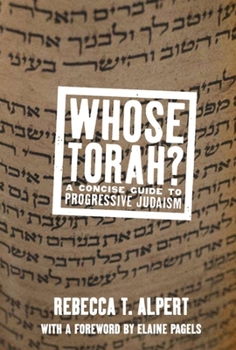Whose Torah?: A Concise Guide to Progressive Judaism
Select Format
Select Condition 
Book Overview
Rabbi Rebecca Alpert is a leading voice in progressive Judaism. A crusader for reform within the Jewish community, she was one of the first women in Jewish history to be ordained a rabbi. Alpert is a celebrated teacher, an expert on Jewish American religious history, and a key public advocate for progressive social issues in contemporary Jewish life. In Whose Torah? , Alpert sketches a compelling portrait of the progressive values that belong to the core of Judaism today. Reaching deeply into the sources of Jewish tradition, she highlights with unflinching moral clarity the textual basis for a truly just vision of life for all who care about sexual, economic, and racial justice and for those who would oppose all forms of discrimination, unjust war, and the destruction of the environment. Alpert also carefully considers what it means to be Jewish in contemporary America--offering both a passionate and deeply learned defense of progressive Jewish identity. Whose Torah? will be an essential intellectual resource for progressive Jews and for anyone searching for the religious underpinnings of contemporary progressive politics. Elaine Pagels, Harrington Spear Paine Foundation Professor of Religion at Princeton University, is the author of numerous, widely acclaimed books on Gnosticism and early Christianity, including The Gnostic Gospels, Beyond Belief, and Reading Judas.
Format:Hardcover
Language:English
ISBN:159558336X
ISBN13:9781595583369
Release Date:June 2008
Publisher:New Press
Length:164 Pages
Weight:0.70 lbs.
Dimensions:0.7" x 5.8" x 7.4"
Customer Reviews
1 rating
What the Old Testament Really Says
Published by Thriftbooks.com User , 16 years ago
Alpert, Rebecca T. "Whose Torah: A Concise Guide to Progressive Judaism", New Press, 2008. What the Old Testament Really Says Amos Lassen Rebecca Alpert is one of the first women to be ordained a Rabbi and has written wifely. Her new book "Whose Torah" is part of the "Whose Religion" series published by the New Press and in it the author looks at some of the major issues of modern times and shows how the Old Testament deals with them. It is a way to look at how the Jewish people have adapted to changing times. She examines the ways the Jewish people have used their traditions to seek and to find justice in areas such as race, sexuality, gender, environment, poverty and war and peace. She has a lot to say and much of what she says is illuminating. I consider myself to be quite well read about my religion as well as a practicing Jew but Alpert has a great deal to tell me. I found her chapters on sexuality and gender to be true eye openers. One of the main tenets of Judaism is the pursuit of justice and Alpert looks at everything with that in mind. She shows how members of the progressive Jewish community reshape questions about peace and activism. It is amazing and enlightening to see how progressive Jews have been (even the Orthodox branch) about some of the issues. Alpert manages to mix religious values with progressive politics as she throws out the preconceived ideas that religions are inherently conservative. I think that reading the 164 pages of "Whose Torah" taught me a great deal more than spending hours pondering the religious tests. But reading this book did something else for me. It caused me to go to the original texts and look for the answers and more than that--it made me think.





